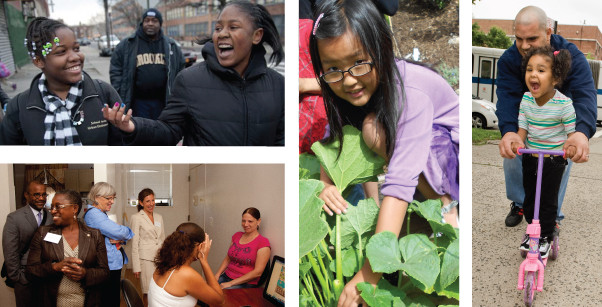Last week, The Urban Institute with CSH and the Center for Study of Social Policy (CSSP), held a 2-day national convening to design a national evaluation of the ACYF-funded demonstration project that is testing an intensive approach that pairs supportive housing with on-site case management and a comprehensive array of services for families experiencing repeated homelessness, substance abuse and mental health problems, and child welfare involvement.
Objectives of the convening included understanding local program models and evaluation designs, co-designing the national evaluation, gaining knowledge useful for building local implementation capacity and completing portions of Implementation Plan, developing working knowledge of demonstration site approaches, and building relationships with colleagues in other sites.
The convening was attended by roughly 60 participants including Federal officials, national philanthropic leaders, and local child welfare, housing and social services representatives from the five national grantees of an initiative of the U.S. Department of Health and Human Services, Administration for Children and Families, the Robert Wood Johnson Foundation, the Annie E. Casey Foundation, Casey Family Programs, and the Edna McConnell Clark Foundation.
At the event, Commissioner Bryan Samuels, Commissioner, Administration for Children, Youth and Families, US Dept HHS, made a presentation to the grantees, encouraging them to step out of their “comfort zone” and develop innovative supportive housing interventions for families with the most needs, and at-highest risk of repeat involvement in the child welfare, homeless, and other public systems.
Jennifer Ho, Special Advisor to the Secretary of HUD, Sean Donovan, also addressed the grantees. Jennifer inspired the grantees with her own account of developing and providing supportive housing to families with the most needs. Jennifer explained through the experience of case manager, the philosophy of supportive housing case management—to stay with tenants through their challenges, maintaining a strong focus on setting and meeting family goals, being flexible and doing “whatever it takes” to engage and support tenants.
Urban Institute is conducting a national, cross-site evaluation of the demonstration project. Funding for the national evaluation is being provided by the four philanthropic organizations: Robert Wood Johnson, Annie E. Casey and Edna McConnell Clark foundations and Casey Family Programs.
Both local and national evaluations include a process outcome and cost study. CSH and CSSP are providing technical assistance to the sites through the The Child Welfare & Supportive Housing Resource Center. The Resource Center provides and coordinates tailored, one-on-one expertise and services to help meet each site’s needs. In addition, the Resource Center will encourage and support peer learning among the five sites, building on local capacity and the experience of people working in the field.



